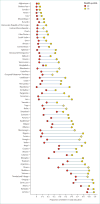Early childhood development coming of age: science through the life course
- PMID: 27717614
- PMCID: PMC5884058
- DOI: 10.1016/S0140-6736(16)31389-7
Early childhood development coming of age: science through the life course
Abstract
Early childhood development programmes vary in coordination and quality, with inadequate and inequitable access, especially for children younger than 3 years. New estimates, based on proxy measures of stunting and poverty, indicate that 250 million children (43%) younger than 5 years in low-income and middle-income countries are at risk of not reaching their developmental potential. There is therefore an urgent need to increase multisectoral coverage of quality programming that incorporates health, nutrition, security and safety, responsive caregiving, and early learning. Equitable early childhood policies and programmes are crucial for meeting Sustainable Development Goals, and for children to develop the intellectual skills, creativity, and wellbeing required to become healthy and productive adults. In this paper, the first in a three part Series on early childhood development, we examine recent scientific progress and global commitments to early childhood development. Research, programmes, and policies have advanced substantially since 2000, with new neuroscientific evidence linking early adversity and nurturing care with brain development and function throughout the life course.
Copyright © 2017 Elsevier Ltd. All rights reserved.
Conflict of interest statement
We declare no competing interests.
Figures





Comment in
-
Early childhood development: the foundation of sustainable development.Lancet. 2017 Jan 7;389(10064):9-11. doi: 10.1016/S0140-6736(16)31659-2. Epub 2016 Oct 4. Lancet. 2017. PMID: 27717607 No abstract available.
-
Good early development-the right of every child.Lancet. 2017 Jan 7;389(10064):13-14. doi: 10.1016/S0140-6736(16)31700-7. Epub 2016 Oct 4. Lancet. 2017. PMID: 27717608 No abstract available.
-
Expanding the evidence base to drive more productive early childhood investment.Lancet. 2017 Jan 7;389(10064):14-16. doi: 10.1016/S0140-6736(16)31702-0. Epub 2016 Oct 4. Lancet. 2017. PMID: 27717609 No abstract available.
-
A good start in life will ensure a sustainable future for all.Lancet. 2017 Jan 7;389(10064):8-9. doi: 10.1016/S0140-6736(16)31774-3. Epub 2016 Oct 4. Lancet. 2017. PMID: 27717611 No abstract available.
-
The early years: silent emergency or unique opportunity?Lancet. 2017 Jan 7;389(10064):11-13. doi: 10.1016/S0140-6736(16)31701-9. Epub 2016 Oct 4. Lancet. 2017. PMID: 27717612 No abstract available.
-
Nurturing care: promoting early childhood development.Lancet. 2017 Jan 7;389(10064):91-102. doi: 10.1016/S0140-6736(16)31390-3. Epub 2016 Oct 4. Lancet. 2017. PMID: 27717615 Review.
-
A call for parenting interventions for refugee mothers with children younger than 3 years.Lancet Psychiatry. 2017 Aug;4(8):583-584. doi: 10.1016/S2215-0366(17)30255-9. Lancet Psychiatry. 2017. PMID: 28748795 No abstract available.
References
-
- Lake A, Chan M. Putting science into practice for early child development. Lancet. 2015;385:1816–17. - PubMed
-
- Engle PL, Black MM, Behrman JR, et al. Strategies to avoid the loss of developmental potential among over 200 million children in the developing world. Lancet. 2007;369:229–42. - PubMed
-
- Engle PL, Fernald LC, Alderman H, et al. Strategies for reducing inequalities and improving developmental outcomes for young children in low-income and middle-income countries. Lancet. 2011;378:1339–53. - PubMed
-
- Walker SP, Wachs TD, Gardner JM, et al. Child development: risk factors for adverse outcomes in developing countries. Lancet. 2007;369:145–57. - PubMed
Publication types
MeSH terms
Grants and funding
LinkOut - more resources
Full Text Sources
Other Literature Sources
Medical

